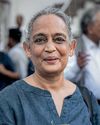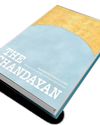
It was supposed to be a soiree celebrating the birth anniversaries of two great Bengali poets—Rabindranath Tagore and Kazi Nazrul Islam—in the sprawling nat mandir (dance hall) of Radha Govinda Jiu temple at Nabadwip, in West Bengal’s Nadia district. But, an hour before its start on May 24, amidst sudden commotion, the organisers were made to remove a picture of Nazrul and delete his name from the title— Rabindra-Nazrul Sandhya—by temple authorities. Later, it emerged they had bowed to ‘pressure’ from the BJP, who did not appreciate the celebration of a Muslim poet in a Hindu temple space.
The targeting of Nazrul by the BJP has a history. As an icon who in many ways bridges the religious chasm that has scarred Bengal, he may not be particularly easy to villainise, but typifies the culture of exchange and reciprocity the party tends to look askance at. So it was entirely in character when, during the 1999 Lok Sabha campaign, Bengal BJP leader Tapan Sikdar disparaged him as a "modhyo-medhar Mussalman kobi" (a second-rate Muslim poet). To that extent, the basic instinct is familiar from other saffron laboratories: go hard at spaces and figures of syncretism who create a climate opposite to one conducive to Hindutva. But under that broad umbrella, the BJP’s ongoing advance into West Bengal politics has been seeing a perceptible shift—a conscious tactical adaptation to the local habitus.
This story is from the {{IssueName}} edition of {{MagazineName}}.
Start your 7-day Magzter GOLD free trial to access thousands of curated premium stories, and 9,000+ magazines and newspapers.
Already a subscriber ? Sign In
This story is from the {{IssueName}} edition of {{MagazineName}}.
Start your 7-day Magzter GOLD free trial to access thousands of curated premium stories, and 9,000+ magazines and newspapers.
Already a subscriber? Sign In

FINGER CLICKING GOOD
Finally there’s a Smartphone that’s fit to fire your DSLR

RAISING THE BAR
In the dynamic world of mixology, where every drink tells a story and every pour is a masterpiece, a new chapter is being concocted by some of the bars. Here are eight bars that stirred up a riot.

TRUE BLUE
BLUE MAY BE a colour traditionally associated with all things royal, but when it comes to haute horology, especially Breguet, the hue lends its own cues.

DELICIOUS DINING WITH A SIDE OF LUSCIOUS VIEWS
Bonita, a quietly charming restaurant in Goa’s Arossim brims with flavour and a stunning landscape to boot.

A YEAR OF WONDER
Globetrotting to some of the more interesting travel options that spiced the calendar year

THE TASTE TEST - Some of the more interesting restaurants launched in Asia in 2024
In the dynamic culinary landscape of Asia, Spice embarks on a gastronomic journey through a kaleidoscope of noteworthy dining spots that shone through in 2024. From cosy havens celebrating rich cultural heritage using quality local ingredients to chic spaces blending global influences with a playful vibe, each venue offers something special, whether by the beach or beneath starry skies.

TECH TALK
From a Mac that became mini to gizmoheavy watches, from smart air purifiers to intelligent TVs, these top picks defined 2024.

BOOKS TO LOOK FORWARD TO IN 2025
Book review

PEACE ABOVE ALL
Devdutt Pattanaik offers an alternative view of the Harappan civilisation in his newest book, Ahimsa: 100 Reflections on the Harappan Civilization

A Wealth of SCHOLARSHIP
For art historian Aman Nath, 2024 was a great year for art books, demonstrating the range of India's cultural wealth